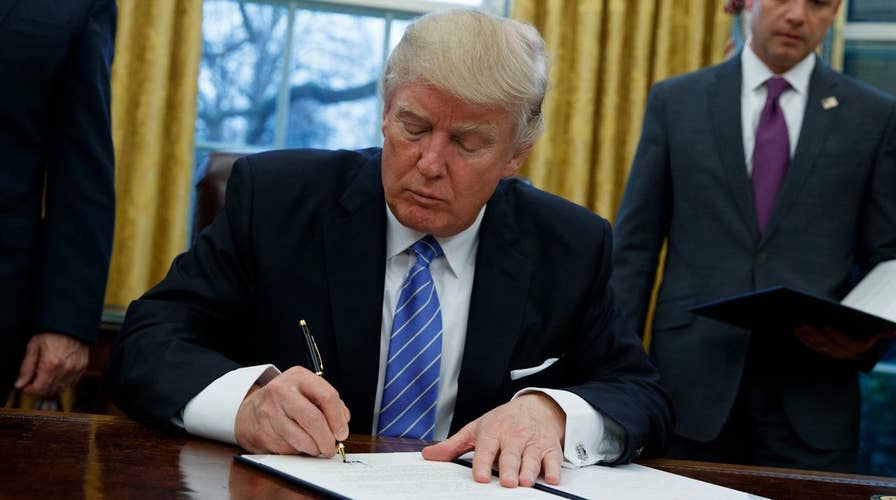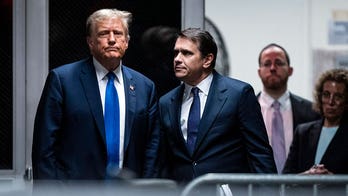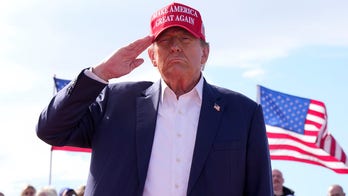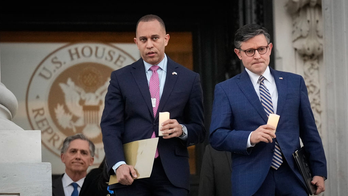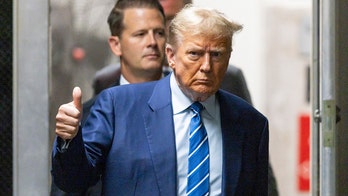Trump signs executive order withdrawing US from TPP
President fulfills campaign pledge on the Trans-Pacific Partnership trade deal; additionally signs order placing hiring freeze on some federal workers, reinstate ban on providing federal money to international groups that perform abortions
Making good on a campaign promise, President Trump on Monday signed an executive order withdrawing the United States from the controversial Trans-Pacific Partnership trade deal.
He also signed two other orders -- one placing a hiring freeze on some federal workers and the other reinstating a ban on funding for international groups that perform abortions.
The TPP, a giant and semi-secret 12-member free-trade agreement advocated by the Obama administration, aimed to deepen economic ties between the U.S. and 11 other Pacific Rim nations, cut taxes and foster trade to boost economic growth in the process.
"We’ve been talking about this for a long time," Trump said, as he signed the document. He called the order to pull out of TPP a “great thing for the American worker.”
Trump argued on the campaign trail that the TPP is harmful to U.S. workers and robs the manufacturing sector.
"We're going to have trades but we're going to have one on one...if somebody misbehaves we will send a letter and they'll have 30 days to work it out," Trump said.
Supporters of TTP said it would have been a boon for all 12 nations involved and would unlock business opportunities on a global scale. Opponents argued, among other things, it would encourage exporting U.S. jobs to low-wage nations.
Trade has been the rare issue where Trump and labor unions have found common ground.
“With this decision, the president has taken the first step toward fixing 30 years of bad trade policies that have cost working Americans millions of good paying jobs,” Teamsters Union President James Hoffa said in a written statement.
But Trump’s stance on trade has created tension from some within his own party.
Sen. John McCain, R-Ariz., called the withdrawal a “serious mistake that will have lasting consequences for America’s economy and our strategic position in the Asia-Pacific region.”
McCain, chairman of the Senate Armed Services Committee, also said the decision will “forfeit the opportunity to promote American exports, reduce trade barriers, open new markets, and protect American invention and innovation.”
He added that it would “create an opening for China to rewrite the economic rules of the road at the expense of American workers.”
On the campaign trail, Trump also criticized NAFTA -- the North American Free Trade Agreement -- saying the U.S. manufacturing sector had been battered by bad trade deals.
During a meeting Sunday, Trump signaled he would make changes to NAFTA. Signed into law in 1994 by former President Bill Clinton, NAFTA is a trade agreement between the United States, Canada and Mexico. It essentially eliminates almost all tariffs between the three nations, allowing the flow of goods and supplies across borders.
One of the other executive orders Trump signed reinstates a ban on federal funds going to international groups that perform abortions or even advocate it as an option.
The ban has been in place since 1984 and has gone back and forth depending on the party in power in the White House.
Pro-life groups praised the decision.
“President Trump is continuing Ronald Reagan’s legacy by taking immediate action on day one to stop the promotion of abortion through our tax dollars overseas," Susan B. Anthony List President Marjorie Dannenfelser said in a statement.
Former President Obama ended the ban in 2009.
Trump reinstated it one day after the Jan. 22 anniversary of Roe v. Wade, the landmark decision that legalized abortion in the United States.
“With this action, Donald Trump has turned his anti-women rhetoric into policy, and made it more difficult for women and families all over the world to access vital reproductive care,” NARAL Pro-Choice America President Ilyse Hogue said in the written statement. “He really is living up to the lowest of expectations.”
The new commander-in-chief also signed an executive order on Monday that froze hiring for some federal government employees.
“Except for the military,” he said when signing it.
